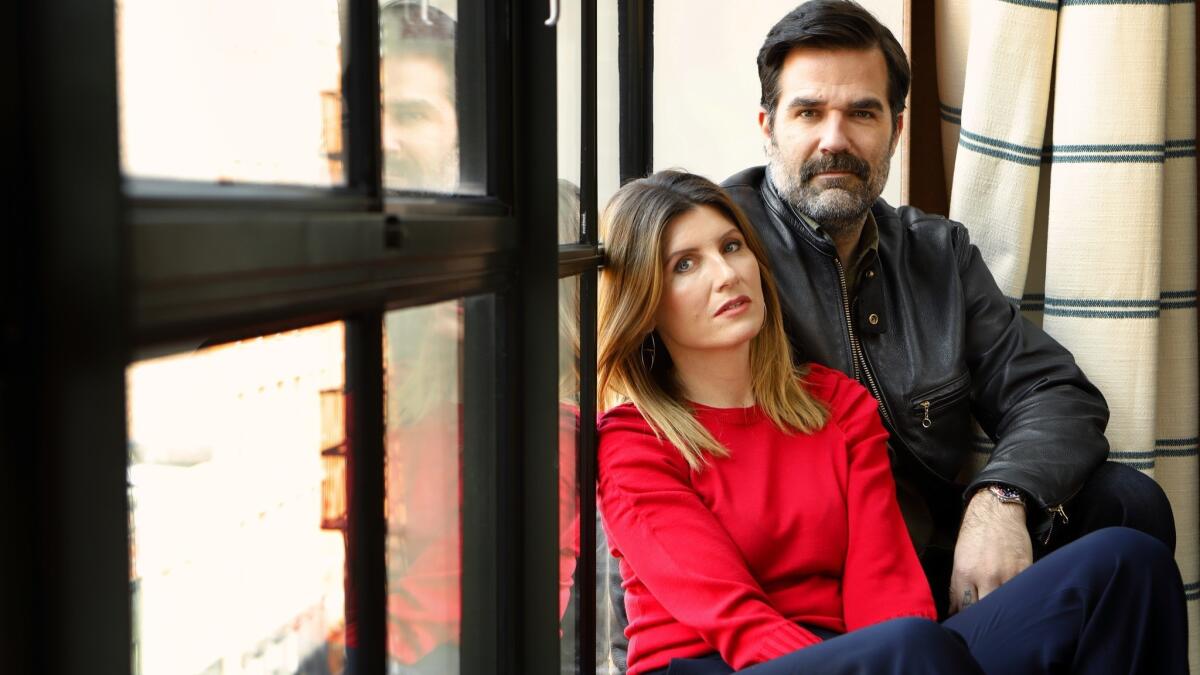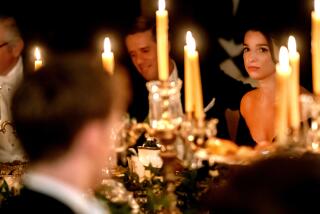Rob Delaney and Sharon Horgan bring their funny, unflinching ‘Catastrophe’ to an end

Reporting from New York — Even for a show that has been unflinching in its depiction of marriage and family life, the fourth and final season of “Catastrophe,” which premieres Friday on Amazon, goes to some uniquely dark places.
In its closing stretch, the series contemplates themes of spirituality and mortality and marital resentment, culminating in a finale that revisits in newly urgent terms the central question of “Catastrophe”: Will Rob and Sharon make it? (The finale aired on the U.K.’s Channel 4 last month, with the Guardian calling it “the greatest TV ending since ‘The Sopranos.’ ”)
“You might have a few months’ rent or mortgage in the bank. You might have a partner that you feel you can depend on. But, really, there’s just no certainty,” says Rob Delaney, who was joined by costar Sharon Horgan this week in New York, where the pair were in a reflective mood about the end of the series. “We can fool ourselves into thinking that there’s certainty, but we wanted to more explicitly show that that’s not something you can truly count on.”
Uncertainty and the random nature of the universe have been themes of the series since the beginning. In the opening scene of “Catastrophe,” Rob (Delaney), an American advertising executive on a business trip to London, meets an Irish schoolteacher named Sharon (Horgan) in a crowded bar. He’s sipping a Coke because he quit drinking years ago after soiling his pants at his sister’s wedding — though he uses more colorful language. A few seconds later, they stumble into bed together.
Ever since that raucous encounter three seasons ago, “Catastrophe” has offered a distinct blend of uproariously filthy humor and brutal emotional honesty, exploring subjects such as death, addiction, postpartum depression and the difficulty of long-term commitment while maintaining a joke-per-minute ratio to rival “30 Rock.”
Created and written by Horgan and Delaney, the not-entirely-romantic comedy follows Sharon and Rob, whose weeklong tryst results in a surprise pregnancy and an even more unexpected marriage. Though they barely know each other, they decide to make a go of it and see if a relationship sparked by instantaneous sexual chemistry can weather the mundane concerns of dual careers and a family that soon grows to include a second child.
“Catastrophe’s” conclusion represents the end — for now, at least — of a fruitful creative partnership between Horgan and Delaney, who first met not in a crowded bar, but on Twitter.
Horgan, a writer and actor was then best known for her bleakly hilarious cult comedy “Pulling,” about three single, hard-partying girlfriends living in a down-market corner of London; while Delaney, a comedian, had earned a following of millions through his deliriously profane Twitter persona.
They struck up a virtual friendship, which eventually led to real-life collaboration on “Catastrophe.” The show’s premise was a sort of composite of their personal lives: Horgan got pregnant not long after she began dating her now-husband; Delaney is a recovering alcoholic and American expatriate raising a family in London.
The comedy became an instant critical darling when it premiered in 2015, and it has helped propel the careers of both of its stars, who were nominated for a writing Emmy in 2016. Also crucial to the success of “Catastrophe” was its supporting cast, including Ashley Jensen and Mark Bonnar, as a married couple whose unhappiness provides a cautionary tale for Rob and Sharon, and the late Carrie Fisher, in one of her final onscreen performances, as Rob’s acerbic mother.
Horgan created the HBO series “Divorce,” Sarah Jessica Parker’s return to series television following “Sex and the City,” and co-created “Motherland,” a typically withering sitcom about parenthood for BBC 2. She has branched out into directing through an episode of the upcoming Amazon series “Modern Love” and a feature, “The New World,” for Focus Features.
Delaney starred in the franchise sequel “Deadpool 2” and will be seen in “Fair and Balanced,” Jay Roach’s film about Roger Ailes and Fox News. He’s also become politically outspoken, using his Twitter account to advocate for Medicare for All and Sen. Bernie Sanders’ presidential candidacy.
Making “Catastrophe” with Delaney has “made me a bit harder on myself,” says Horgan, whose natural ebullience is tempered somewhat by a bad case of jet lag. The show “was exactly what we wanted to make, and that’s very unusual. It’s kind of spoiled me a bit, I think.”
Delaney — tall and burly and currently sporting a bushy mustache that underscores his cartoonish handsomeness — likens his and Horgan’s real-life relationship to that of fraternal twins. “I think, maybe if they did one of those family genealogy things, they’d find out that, in fact, Sharon and I are not-terribly-distantly related.”
He continues: “Working with Sharon has helped me figure out how to really cut out the fat and go for the jugular and not waste anyone’s time, to understand that it’s such a privilege to get to make television, that if people tune into your show, that’s amazing the gift that they’ve given you. Do not waste their time. Don’t waste your writing partner’s time in the room.” He pauses a beat. “Unless you have a particularly funny meme to show them.”
Released on Amazon two years ago, Season 3 of “Catastrophe” followed Rob as he fell off the wagon, secretly drinking during the day and disguising the smell of booze by strategically gobbling bags of cheese and onion chips, a ruse that’s effective until he gets in a drunken car wreck. “We really worked to make sure that it was a real quotidian, garden-variety alcoholism with a side of lies, so that it really hurt,” says Delaney.
When the series resumes, Rob is spending his weekends doing mandatory community service in a charity shop. Sharon is hardly thriving, either. Left alone to tend their two kids and alarmed that her recently widowed mother has already found a new boyfriend, she develops a reckless habit of her own, switching price tags to get unauthorized discounts on designer jeans and pricey toys.
Following the British model of television, Delaney and Horgan write every half-hour episode of “Catastrophe” on their own rather than relying on a staff of writers, a process that takes several months. “We think of each season as a continuum, even though it’s busted up into episodes. ‘What’s the overall arc that we want to say? What do we want to say about marriage? What do we want to say about love?’ And take it from there.”
They decided how they wanted the series to end fairly early on in the process of writing Season 4. With a parting shot in mind, they worked backward in order to gradually, almost imperceptibly, push their characters “to a point where they could easily turn the table upside-down,” says Horgan. “But along the way, we didn’t want it to feel like that. We didn’t want every episode to be like, this is the final season.”
Ending the series now felt right, in part, because Season 4 “was definitely the hardest to write,” says Delaney, whose personal life was upended during “Catastrophe’s” lengthy hiatus: His 2-year-old son, Henry, died of a brain tumor in January 2018, shortly before Horgan and Delaney commenced writing. In August, his wife gave birth to a baby boy. (The couple has two other sons.)
Delaney said he and Horgan were “reaching around a bit more for a story that was authentic. It would just feel horrible for the show to manufacture storylines that didn’t feel like they came out of a place that was real. That was something we gave a [expletive] about.”
The message they hope viewers will glean from four seasons of “Catastrophe” is fairly simple, says Delaney: “Be kind, and work hard in your relationship, I guess. It won’t be easy; it’s not supposed to be, meatball. And keep making the choice. The thing is, Sharon and Rob make the choice again and again to be together. In a marriage that endures, you have to do that. There’s no coasting.”
“I just hope that people laugh heartily at it,” Horgan adds, “and really relate to the characters and what they’re going through.” She points to a moment in the show’s first season when Sharon and Rob learn their child is at risk for Down syndrome and briefly panic. “Saying those fears out loud is probably one of the scariest things we’ve done, I think.”
Horgan and Delaney say they’d like to collaborate again, and, having been inspired by Richard Linklater’s “Before” trilogy, they are at least theoretically open to revisiting their characters in the future. But it won’t be anytime soon, says Delaney: “We’ve said what we wanted to say and not a syllable more.”
See the most-read stories in Entertainment this hour »
‘Catastrophe’
Where: Amazon Prime
When: Any time, starting Friday
Rating: TV-MA (may be unsuitable for children under the age of 17)
Follow me @MeredithBlake
More to Read
The complete guide to home viewing
Get Screen Gab for everything about the TV shows and streaming movies everyone’s talking about.
You may occasionally receive promotional content from the Los Angeles Times.






